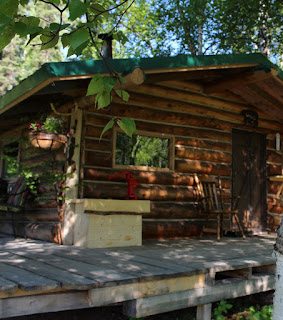Boreal
forests have always been intriguing to me.
In Upstream, Eric Wade and his wife of 44 years, who is a talented photographer, welcome us into their life in a cabin on a river, amid birches and willow trees, where they share reflections, adventures and observations about the plants and animals in the area.
Eric Wade paints vivid pictures with words,
capturing the touch of the seasons. The simplicity of his days summons up
memories, and encourages him to appreciate those memories through the lens of
experience and wisdom.
He expresses a certain ambivalence regarding
the aging process. He ponders over his health issues, which he attributes to
aging, and acknowledges the limitations that these ailments impose on his body
and mind, but he also affirms that aging does not fade the zest for
accomplishing one’s goals. He cites various examples of people who made
significant accomplishments in their senior years. Nola Ochs graduated from
Fort Hayes State University in 2007 at the age of 95 with a degree in general
studies; Lew Hollander, an ironman who competed in triathlons in his eighties;
Peter Roget published his famous thesaurus at age 73. Grandma Moses began
painting in her seventies. She died at age 101 after painting more than fifteen
hundred masterpieces. I am adding Nikki Kenward to his list: she became a
trapeze artist in her sixties… and the list goes on if we care to research this.
Eric Wade and these people inspire us to cultivate tenacity
and perseverance in every aspect of our lives.
Eric Wade’s life experience regales us with musings and introspection, engaging our senses and restoring hope despite the obstacles and difficulties we may have to contend with. He ventures to contemplate life from a new dimension of curious humility: “Lots of decisions are influenced by the myopic views we hold because we seldom venture from our daily line. We don’t know where we are or who we are and, ultimately, we end with regrets. Perhaps that’s why we don’t like one another. How can we like what we don't know? If I don’t know about you, why should I ever care about you? If I don’t know about the wilderness, why should I care about it? If I don’t know about the short lives of food I eat—plant or animal—why should I give it a second thought?”
His inquisitive nature and his humble attitude inspire us to become curious about the natural world: “This large birch enjoyed a view of the entire homestead. What messages was it sending and receiving? I know I don’t have the capacity to learn what goes on in the natural world, certainly not. Aldo Leopold put it this way ‘Only the mountain has lived long enough to listen objectively to the howl of the wolf.’ Perhaps I could work a lot harder.”
I don’t agree with him when he associates beauty with deception. The purpose of thorns in roses is not to cause deception. The way I see it, every rose, no matter how beautiful, has the right to defend herself. By the same token, owls do what they need to do to survive, and nobody should blame them for this.
Upstream was published by Shanti Arts Press.
The
photographs for this post were kindly provided by Eric Wade.
Eric Wade is a writer, teacher, musician,
naturalist and outdoorsman. He is also the author of Cabin: an Alaska Wilderness Dream. He earned a bachelors in English education at Southern Oregon
University and a masters in Journalism from the University of Oregon. He served
as a public-school teacher, principal and director of non-profit corporations
for more than forty years.






